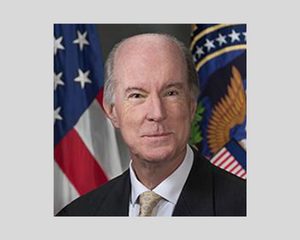
On Wednesday, April 13, 2016, the Strauss Center, UT’s Intelligence Studies Project, and the Clements Center hosted Dr. Gregory Treverton, chairman of the National Intelligence Council (NIC) and advisor to the Director of National Intelligence. The topic of Dr. Treverton’s talk concerned the National Intelligence Council’s work with analyzing global trends. He first spoke on the NIC as an organization, offering insight into their mission and future goals.
The NIC is an intelligence analytic working group within the Office of the Director of National Intelligence (ODNI), and provides intelligence support to various entities such as the Principals Committee and Deputies Committee of the National Security Council. Dr. Treverton mentioned at one point, the NIC questioned its own relevance in the intelligence community. Today, its importance is prevalent, and the NIC continues to develop and analyze its strategic objectives. To this end, the NIC is striving to become more transparent and engaged as an intelligence organization.
The Global Trends Report is one of the NIC’s most highly regarded products. The reports shape strategic conversations within and beyond the US Government. Dr. Treverton spoke on global trends in the frame of a 20-year projection as well as important trends to watch within the next five years. In his 20-year forecast, Dr. Treverton stressed the importance of several cases: the increasing empowerment of individuals in small groups, such as terrorist organizations and private financial organizations; witnessing a period of slower global economic growth; conflicts between the values of nations and organizations; increasing technology, including the growth of the artificial intelligence sector and increases in bio-technology; an ongoing disconnect between nation states and their citizens; and the changing nature of warfare the world is beginning to witness with the rise of extremist groups like ISIS.
Within the next five years, Dr. Treverton expects the Middle East will continue to be a global challenge, Europe will be beset by migration problems and a disconnect will continue between the European Union and its member nations, and we will see the economic collapse of several countries. Dr. Treverton asserted that Russia will continue to meddle in European affairs and self-inflecting its own demise. He is uncertain, however, about the role of China and the U.S., and if China will be able to overcome its current challenges, and how the U.S.-China relationship will evolve.Dr. Treverton previously held several leadership positions at RAND, including director of the RAND Center for Global Risk and Security, director of the International Security and Defense Policy Center, and associate dean of the Pardee RAND Graduate School. His work at RAND has examined terrorism, intelligence and law enforcement, as well as new forms of public–private partnership.
Dr. Treverton previously held several leadership positions at RAND, including director of the RAND Center for Global Risk and Security, director of the International Security and Defense Policy Center, and associate dean of the Pardee RAND Graduate School. His work at RAND has examined terrorism, intelligence and law enforcement, as well as new forms of public–private partnership.
Treverton has served in government for the first Senate Select Committee on Intelligence, handling Europe for the National Security Council and later, as vice chair of the National Intelligence Council (1993–1995), overseeing the writing of America’s National Intelligence Estimates.
Photos of this event can be accessed here.



